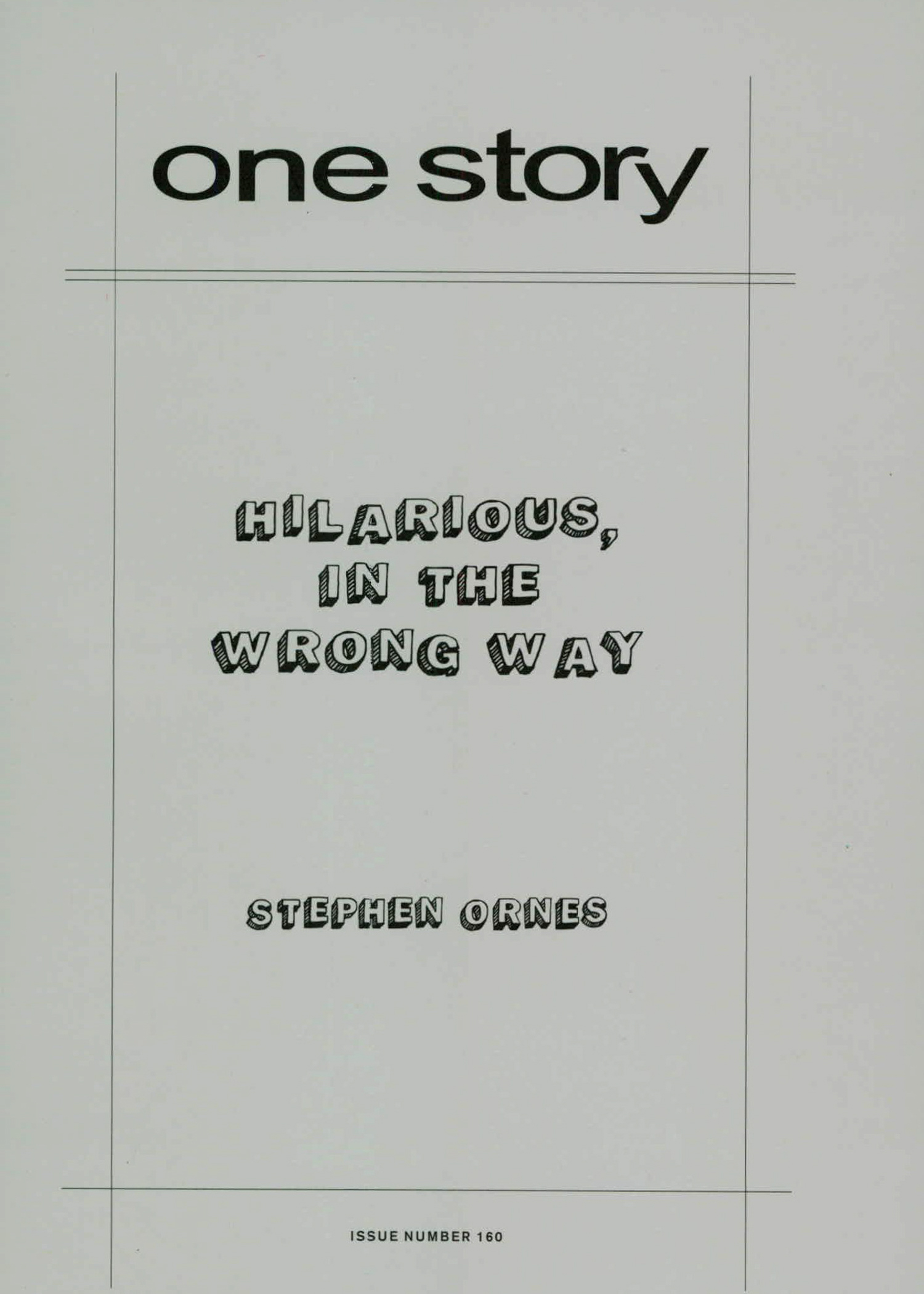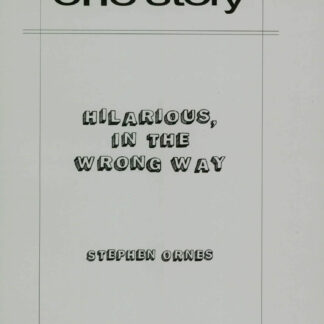
Hilarious, in the Wrong Way
$2.50
69 in stock
Excerpt
At the end of school, the intercom crackled and hissed before going quiet. Then the principal Mr. Weathers got on and said that Theodore was dead, and asked if we could have a moment of silence? The intercom was mounted over the door, concealed in a weathered wooden box that tilted so far from the cinder block wall it looked ready to fall down on someone’s head. I wondered if it had always been that way. I looked down and saw that my pencil still hovered over my paper because I hadn’t finished writing everything down from the board before Mr. Weathers said Theodore is dead.
Theodore and I were friends. He told me two weeks ago that if I wanted to know something about music I should listen to ZZ Top’s Afterburner. He gave the tape to me on the spot, and I listened to it all the time even though I didn’t like the music very much. Theodore said, when he gave it to me, That’s the one, that’s the one.
It lasted forever, the moment of silence. I looked around to see what people were doing but everyone stared at their desks and Janette Hanes clicked her long fake fingernails against her teeth.
Stephen Ornes
Stephen Ornes lives in Nashville, Tennessee where he writes from a backyard shed. His articles about science and scientists have appeared in national and international publications, including Discover, New Scientist and Science News for Kids. His fiction has appeared in Arcadia, and his essays have been published in the New Haven Review. He is at work on a novel.
Q&A by Michael Pollock
- MP: Where did the idea for this story come from?
- SO: The first piece of this story to fall into place was the conversation between Ben and Brandon on the island. (“Either I’ll die first or you will.”) Many years ago, I had been writing a story about a brother who helps his sister fake her own funeral, and the dialogue arose between those two characters. That story fell apart, but I kept revising that little conversation. After many revisions, it still seemed juvenile, or like a sketch comedy standup of a talk between Keith Richards and Mick Jagger. I finally decided it would work in a story centered on a young narrator with a strong imagination. I was a graduate student in mathematics from 2001-2003, and I was interested in the idea of an unstable equilibrium. That’s like a marble balanced on top of an overturned bowl: it can stay in place, as long as you don’t nudge bowl or the marble. So I think with those equations in my head, and that conversation kind of floating around, I arrived at thinking about a character who, like an ignorant marble, suddenly realizes he—or anyone else—can slide down the bowl at any time. That became Ben.
- MP: What was the most challenging aspect of writing this story?
- SO: It took me a long time to decide when it was “done” and ready to go out. Also, I struggled with tenses and point of view. For awhile, I wanted it to be in the present tense, third person, which seemed more like an experiment gone wrong than a story. I switched to the first person quickly and later switched the tense. Also, figuring out the best ways to use Roxie and Jesse was a bit of a challenge. I wanted them there but I wanted them to be more than touchstones for Ben.
- MP: Why did you choose to set the story in this lake town and in the late ‘Finish this sentence in just one word—the word you think best captures it: “This story is about __________.”0s?
- SO: I grew up near a lake, and many lake communities fed my schools, so it was easy to cull details about that setting from my own life. Lakes have always seemed so full of possibility; they may be smooth on the surface but brimming with fish and snakes and who knows what beneath. They reflect the sky but hide their innards. When I sketched out the story, it seemed obvious that Ben would live on a lake. Also, the ZZ Top Afterburner album was the first cassette tape I ever bought. It was an impulse buy; in the late ‘80s I had a few dollars and a burning desire to be cool. I still don’t know why Afterburner seemed like it would satisfy that desire; I’d never even heard of the band. I loathed the music but listened to it anyway, like Ben.
- MP: Do you Jet Ski?
- SO: Yes! My mother bought one when she retired, and it’s got a kick. I’ve gained enough confidence on it that I even take my kids for rides when we visit. I based the Wave Pulser 1989 Plus on the earliest models of the one my mom rides with her Jet Ski gang. (Also, I think I was starting this story about the time she retired.)
- MP: What effect does your science writing background have on your fiction writing?
- SO: I often get ideas for fiction while reading papers or talking with scientists, or even fact checking, but the inspiration is always oblique. A comment or an observation or a statistic may trigger some unrelated realization in my head about a (fictional) character’s life or appearance. Also, I think that studying and teaching mathematics made me a better writer. Proofs are compact little packets of truth that have to be rigorous and efficient. The best proofs are also elegant; they’re easy to understand, they don’t waste your time, and the logic is airtight. I think that’s true about short stories, too. I don’t want to waste my reader’s time. I want the story to be easy to understand. Actually, that’s true for science writing, too.
- MP: I was initially drawn to the story by Ben’s unique voice that shows his age but also how he is wise beyond his years. How did you come across it?
- SO: I’m not sure; it was more the outcome of countless revisions than an original intention. After many rounds of piling on words and chiseling them off again, his voice emerged. In earlier drafts, he’d been even younger and sometimes a bit older. I think those laughing fits, which he’s always had, set him apart from other people and forced him to be a reluctant observer.
- MP: Where did these laughing fits come from?
- SO: I think for Ben, they are the worst-case scenarios of nervous laughter. In his life, they’re a recent development, coincident with the end of elementary and the beginning of the awkward social situations of middle school. They happen when he feels a lot of stress, and the stress exacerbates the fits, which adds to the stress. His “fight or flight” instinct probably lands on “flight” most of the time, largely so he doesn’t have to worry about laughing inappropriately. They don’t happen often, but he feels them building. For me, there was something about inappropriate laughter that seemed like it fit for Ben. I’m not sure why, but I knew early on that he had a case of nervous laughter taken to an extreme. An earlier draft included a scene of Ben getting in trouble on the bus, a week before the action of the story. During that scene, he had a really terrible fit where the nervous tittering led to solid, loud laughter in the face of Janet, the haggard bus driver. The fit brought humiliation but, at the same time, the respect of his classmates.
- MP: How long did it take you to complete this story?
- SO: I wrote the first draft in 2003 and kept it around. I’ve returned to it many times since then, picking at scenes and characters. Last year (or the year before?), I got serious about revising it and compiled all my notes.
- MP: What are you working on now?
- SO: When my son was an infant, I used to take him on these endless morning walks around town. While he slept, I outlined a novel in my head. I’ve almost finished the first draft of that book. I have a few short stories in the hopper. And I’m still a science writer; my work is at www.stephenornes.com.
- MP: What is the best bit of advice about writing you have ever received?
- SO: Avoid adverbs. I know it’s not novel, but it’s been useful. For this story, the generous editors at One Story pointed out to me that “questions from a narrator, however true they are to the character’s thoughts, leave the reader in doubt. Concrete details create confidence.” That’s also useful. After they pointed that out, I realized that I follow the same guideline in my science writing and avoid questions within copy as much as possible. Perhaps there’s no faster way to undermine your own authority than to pose a question to your reader.
